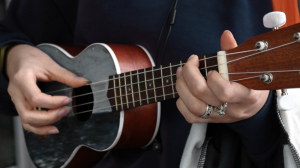Do you know about the Pop and Rock Music Genres? Learn everything about the music genres, their structure, and their rich history.

Guitar vs. Ukulele – Types, Differences, Difficulty, Use
If you’re looking to learn a musical instrument that can go with any song in the world and help you become a star among your friends—you might consider learning a guitar or a ukulele.
Guitar and Ukulele
The guitar and ukulele are two of the top instruments from the string family and considerably easier to learn than their brother from the same family. The guitar and ukulele are two incredible instruments that have a lot in common and many differences.
These instruments are easy to transport and fun to play, yet they are entirely different in every way. From shape and structure to chords, strumming, and tuning, they have their differences.
However, learning how to handle one instrument through music lessons will undoubtedly aid your ability to play another, but there are several minor distinctions to be aware of to be good on the guitar and the ukulele.
The Origin of Ukulele and Guitars
Both the ukulele and guitar are popular instruments globally, but guitars have the edge in the production of all sorts of international music. Guitar courses have a high demand among the general population of the world. The global interest in learning the instrument has boosted the market size, reaching 509 million US dollars in 2020.
But the ukulele isn’t far behind its big brother and has witnessed a 9.73 percent increase in yearly sales over the years. Ukulele is often considered a happy instrument and often referred to as the happiest instrument in the world.
While the ukulele has seen a boost in the past 30 years, the guitar has a rich history that tracks back to 1050 BC. Guitars in the ancient time didn’t look as fancy as they do today with metal or copper wirings for better resonation, a hollow timber-made box, and a comfortable grip. Ancient guitars were made of strings stretched over gourds and connected to a thin stick.
Modern technological developments have paved the way for modern guitars acoustic and electronic guitars that can shake the roof of an arena with a single strum and use modern devices to project the sound to the back row.
Key Difference between Ukulele and Guitars
Anyone who’s seen the two instruments before can instantly point out some difference based on the visual evidence. Anyone who’s played both the instruments before can point out several differences in the two’s style, chord, and tunings. However, let’s point out some fundamental differences between a ukulele and a guitar:
A guitar is larger than a ukulele
Guitars comprise six strings, while a ukulele is made up of four.
All ukuleles are made of classic nylon strings, while some modern models have steel strings. Guitars are made up of steel, metal, or copper strings, each with its own unique sound, strumming pattern, and projection.
Guitars are more expensive as compared to a ukulele.

Ukulele vs. Guitar–which is Easier to Play?
If you merely want to learn how to play an instrument quickly, the ukulele is the way to go. You can perform a broad selection of tunes if you master 3 or 4 chords. With just a few dozen chords under your belt, you’ll be able to play almost any song you stumble across.
This is also true with the guitar. But on the other hand, a guitar is larger, thicker, and has more chords. Metal acoustic guitars are also tougher on the fingers, but most novice players get used to it fast.
Just because the ukulele is easier to play doesn’t make it easy to master. Certain chord maneuvering and strumming patterns are as tricky as in a guitar.
Ukulele vs. Guitars–Difference in Sound
Whether you’re looking for a nice melodic tune or a headbanger performance in your garage, the guitar can do it all.
You may choose between an acoustic guitar and an electric one when buying a guitar. In terms of tone, the guitar has a significantly greater range. Its fretboard is substantially longer than a ukulele’s, allowing it to achieve much deeper tones.
Whereas a ukulele’s sound isn’t exceptionally diverse, it is distinctive. The traditional Hawaiian tone provides the ideal backdrop for a day at the beach. Depending on the size of the ukulele you choose, there are several tones that you can perform. Despite its limited range, you can still play a wide variety of music with this instrument.
Common Types of Ukulele
Ukulele comes in four different types:
Sopranois the conventional form of ukulele that is most people familiar with. These instruments are small and often used in music courses for beginners. The small size of the instrument is easy to hold and play without too much arm and shoulder stress
Concert is larger but consists of the same strumming patterns and tuning as the Soprano. The sound projection of this type is somewhat larger based on the instrument’s bigger size.
Tenor is a long handle ukulele as well in which the G string is tuned similar to that of a guitar.
Baritone is the largest ukulele and has the first four strings tuned the same as a guitar.

Common Types of Guitar
Guitars come in all kinds of shapes and sizes. A full-sized guitar can be much larger than a Baritone ukulele, while a classical guitar is small in size and perfect for beginners in guitar classes.
There are many guitars to choose from, all fitting their appropriate music genres:
Acoustic guitars are made up of steel or copper wires and come in various sizes, including a 12-string guitar and a dreadnought. There are electro-acoustic guitars that are similar to acoustic guitars but can be amplified.
Electric Guitar generates different music from that of an acoustic guitar. These guitars generate sound by converting vibration into electric waves using electricity.
Bass Guitar is often played alongside an electric guitar and produces a lower frequency sound than others. Bass guitars may vary in size, with some having four strings while others comprise 5 or 6 strings.

Get Ukulele and Guitar Lessons from Music School in Abu Dhabi
If you’re looking to get music instrument lessons—consider The Young Musician Musical Institute in Abu Dhabi.
We have one of the best faculties for international music that can guide musicians of all ages to discover their path towards building a career in music.
We offer high-standard music courses and musical instrument lessons for guitar, ukulele, piano, violin, etc. We’re also renowned for offering a music course diploma, affiliated with the Trinity College of London.
Contact us to learn more about what we do and how we can help you in realizing your true potential in the field of music.

